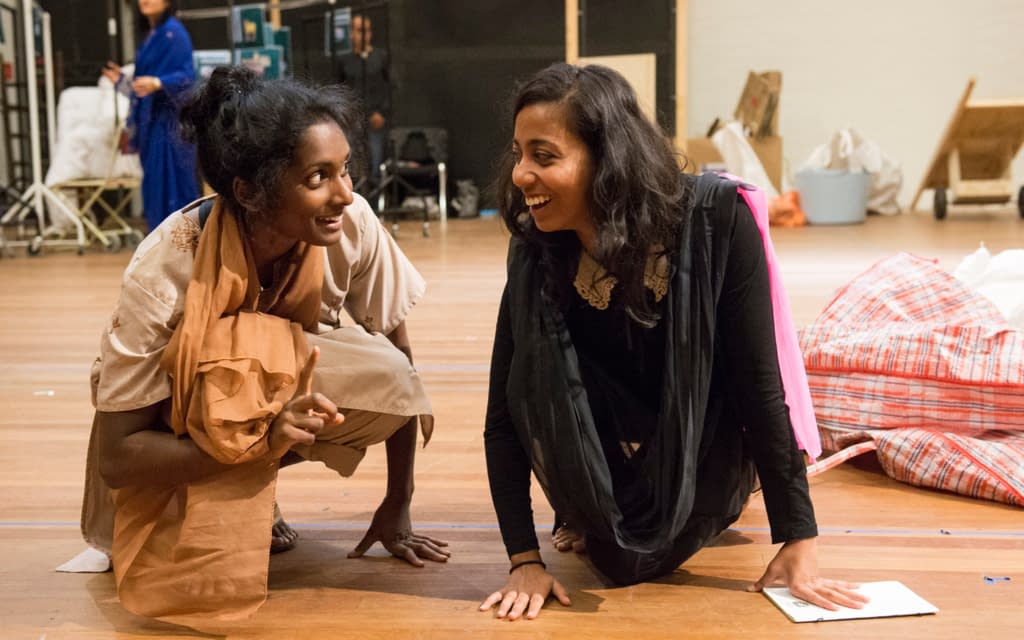Last week, Asian Voice had the pleasure of previewing the National Theatre’s production of Behind the Beautiful Forevers. Based on the National Book Award-winning novel by Katherine Boo, the play presents globalisation from the perspective of the Mumbai slum dweller, particularly, as director Rufus Norris expressed, with the thinking that “these people have every strand of complexity that” we possess as westerners. Indeed, the assortment of dynamic characters that drives the story forwards originates from Boo’s three years of intimate research in the poverty-stricken area of Annawadi, behind Mumbai airport. In this way, Behind the Beautiful Forevers does not so much tell of economic inequality as actually show it.
As we see in the ambition underlying the bolshiness of Zehrunisa Husain (played by Meera Syal), or the intellectual curiosity of wannabe student Manju Waghekar (Anjana Vasan), personal conflict and yearning are what emphasise the ideological gap. The blind-spot of capitalism as a globally beneficial system hits home through the emotional landscape of the slum as well as the physical one. This is what makes the narrative so perfect for the proximate medium of theatre and what struck me in the rehearsal room. Though we are overwhelmed by a shiny stage strewn with rubbish and various containers- bottles, cardboard crates, buckets- the characters move around in a homely manner. People wash clothes and chat casually in groups as if there isn’t a care in the world. Because, of course, this is their home, their place to dream and that is the bitter-sweet point. We are both discomfited and heart-warmed because we can see the whole metaphysical picture; that, again as director Norris summarised, “these people are just like us, just in a different situation.” One our first-world lives are inevitably complicit in: “we can’t live the way we do without somebody on the other end balancing it out.”
It would almost be as if we were gazing at the slum from one of the five-star hotels lining the airport were it not for the holistic beaut. The idea that in an alternate reality, these vibrant inhabitants could have just as easily been us, creates a shared feeling of humanity so that in the moment we are the Annawadi people. The bit where Manju and her protégé make fun of the English word ‘gallants’ for sounding too posh, was a salute to this porous cultural space. As Pal Aron who plays The Master in the production told us ‘these people have pride too.’ Elaborating from a childhood memory in India he said “I remember seeing two ‘beggars’ who were sharing a plate of rice in the candlelight, and they were laughing and joking. They had integrity.”
The comedy of the play also reflects our mutual spiritual existence: “We did not need to plan the humour,” explained the cast. “It arises from the situations themselves: it’s funny and sad because that is the human condition.” Seeing Chook Sibtain’s frightful yet somehow spirited appearance as the sub-inspector Yanka Sheram certainly convinced me. In fact, added comedy/drama writer and actress Meera Syal, “perhaps these people are so witty because of their oppression. They have to think on their feet to survive and so they are quick- witted. As the author Katherine Boo said, ‘this may be gallows humour, but it is still humour.”
The commitment to three-dimensional characters carries a truly democratic message. We are able to value those on the other side of capitalism because we feel connected to them through time and space. The debris of the set also reflects the political reconciling going on in the audience; the containers represent transition, while the litter is the emotional residue from linking the spheres of consumerism and production in the consciousness. As the writer of the play David Hare has said, in an age of fast information and cold numbers, theatre can sometimes deliver where ‘journalism fails.’ In the case of the National Theatre's Behind the Beautiful Forevers two seemingly different worlds collide to jolt, excite and motivate us into action. Previews start from 10th of November. Get your experience now!







